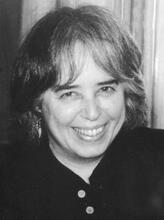Charlotte Zolotow
Charlotte Zolotow studied at the University of Wisconsin before joining Harper & Row, where she was Children’s Division senior editor from 1938 to 1944 and from 1962 to 1976. She published her first children’s book, The Park Book, in 1944. Zolotow wrote over 70 children’s books, her best-known being William’s Doll, which was produced as a short film and as a song for the popular children’s album Free to Be … You and Me (1972). Zolotow was Junior Books Division vice president and associate publisher from 1976 to 1981 and became Charlotte Zolotow Books Division consultant and editorial director in 1981. She was a member of the PEN Authors League and received numerous awards for her works. Zolotow’s books are empathetic to children’s feelings and approach difficult topics such as gender roles, death, single parents, and conflict.
Overview
Charlotte Zolotow’s over seventy books for children established her as an influential twentieth-century author. Her best-known story is William’s Doll, which was produced as a short film and as a song for the popular children’s album Free to Be … You and Me.
Zolotow made an effort to see, hear, and think as a child, an empathetic skill she called “a common respect for the child.” Though some of Zolotow’s books do approach difficult topics such as gender roles, death, single parents, and conflict, her literary prowess is most apparent in her ability to capture a sensory or emotional experience and translate it into a dynamic, poetic story.
As an editor, Zolotow worked with books for all ages of children, but she preferred to write picture books. She was excited by the additional dimension of storytelling that an illustrator can add, and she had an editorial talent for matching illustrators and authors. Her own books were illustrated by accomplished artists including Garth Williams, Maurice Sendak, and H.A. Rey.
Judaism did not play an obvious role in Zolotow’s writing. She did, however, feel that the warm extended families who populate her books were echoes of the Orthodox Jewish culture of her own family.
Biography and Awards
Charlotte (Shapiro) Zolotow, born to Louis J. and Ella (Bernstein) Shapiro on June 26, 1915, in Norfolk, Virginia, grew up in New York City. She studied literature at the University of Wisconsin from 1933 to 1936, worked briefly at a collector’s bookshop, then joined Harper & Row, where she was Children’s Division senior editor from 1938 to 1944 and from 1962 to 1976. In 1938, she married writer Maurice Zolotow (whom she divorced in 1969). The couple had two children, Stephen and Ellen (children’s author Crescent Dragonwagon). Harper published her first book, The Park Book, in 1944. Zolotow was Junior Books Division vice president and associate publisher from 1976 to 1981 and became Charlotte Zolotow Books Division consultant and editorial director in 1981. She lectured at writers’ conferences at the University of Colorado and Indiana University, and was a member of the PEN Authors League.
Zolotow’s awards include The New York Herald Tribune Spring Festival Honor for Indian, Indian (1952); Caldecott honors for The Storm Book and Mr. Rabbit and the Lovely Present (1953 and 1963, respectively); American Library Association notable citations for Mr. Rabbit and the Lovely Present, William’s Doll, My Grandson Lew, and Do You Know What I’ll Do?; New York Times outstanding book of the year and School Library Journal best book of the year awards for William’s Doll (1972); Redbook awards for William’s Doll and I Know A Lady (1984 and 1985 respectively); the Christopher Award for My Grandson Lew (1984). Zolotow also received the LMP Award, R.R. Bowker (1990); and the American Library Association tribute (1991).
Ms. Zolotow passed away at the age of 98 on November 19, 2013 in Hastings-on-Hudson, NY.
American Women Writers: A Critical Reference Guide from Colonial Times to the Present. Edited by Lynne Langdon Faust (1983).
Arbuthnot, May Hill, and Zena Sutherland. Children and Books. 4th ed. (1972).
Bader, Barbara. American Picturebooks from Noah’s Ark to the Beast Within (1976).
Carpenter, Humphrey, and Mari Prichard. Oxford Companion to Children’s Literature (1984).
Children’s Literature Review. Vol. 2 (1976).
Contemporary Authors, New Revision Series. Vol. 38 (1993).
Dictionary of Literary Biography. Vol. 52, American Writers for Children since 1960: Fiction (1986).
Herzog, Ricky. "Sissies, Dolls, and Dancing: Children's Literature and Gender Deviance in the Seventies." The Lion and the Unicorn 33, no. 1 (2009): 60-76. doi:10.1353/uni.0.0444.
Hopkins, Lee Bennett. Books Are by People (1969).
Huck, Charlotte. Children’s Literature. 3d ed. (1978), and Children’s Literature in the Elementary School (1976).
Rotskoff, Lori, and Laura L. Lovett, eds. When We Were Free to Be: Looking Back at a Children’s Classic and the Difference It Made (2012).
Rudman, Masha K. Children’s Literature. 2d ed. (1976).
Something about the Author: Facts and Pictures about Authors and Illustrators of Books for Young People. Vol. 78. Edited by Kevin S. Hile (1994).
Twentieth-Century Children’s Writers. 4th ed. Edited by Laura Standley Berger (1995).
Wintle, Justin, and Emma Fisher. The Pied Pipers: Interviews with the Influential Creators of Children’s Literature (1974).
Unsworth, L. “New Literacies and the English Curriculum: Multimodal
Perspectives.” (2008).



